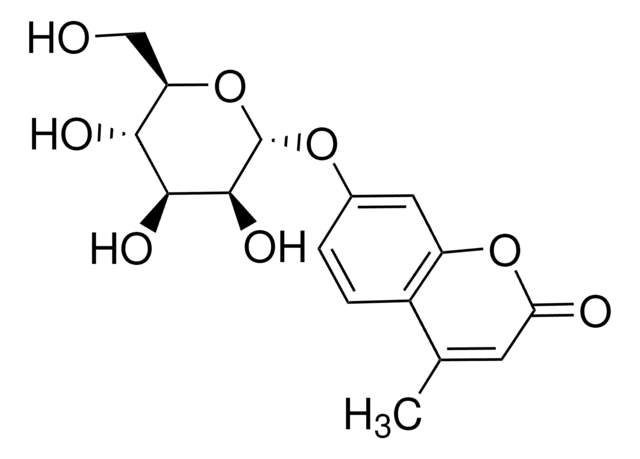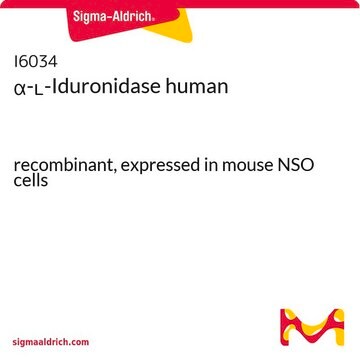M9766
4-Methylumbelliferyl α-D-glucopyranoside
α-glucosidase substrate, fluorogenic, ≥99% (TLC), powder
Sinónimos:
4-Methylumbelliferyl α-D-glucoside
About This Item
Productos recomendados
product name
4-Methylumbelliferyl α-D-glucopyranoside, α-glucosidase substrate
Quality Level
description
α-glucosidase substrate
assay
≥99% (TLC)
form
powder
solubility
pyridine: 50 mg/mL, clear, colorless to faintly yellow
storage temp.
−20°C
SMILES string
CC1=CC(=O)Oc2cc(O[C@H]3O[C@H](CO)[C@@H](O)[C@H](O)[C@H]3O)ccc12
InChI
1S/C16H18O8/c1-7-4-12(18)23-10-5-8(2-3-9(7)10)22-16-15(21)14(20)13(19)11(6-17)24-16/h2-5,11,13-17,19-21H,6H2,1H3/t11-,13-,14+,15-,16+/m1/s1
InChI key
YUDPTGPSBJVHCN-JZYAIQKZSA-N
¿Está buscando productos similares? Visita Guía de comparación de productos
Application
Biochem/physiol Actions
Storage Class
11 - Combustible Solids
wgk_germany
WGK 3
flash_point_f
Not applicable
flash_point_c
Not applicable
ppe
Eyeshields, Gloves, type N95 (US)
Certificados de análisis (COA)
Busque Certificados de análisis (COA) introduciendo el número de lote del producto. Los números de lote se encuentran en la etiqueta del producto después de las palabras «Lot» o «Batch»
¿Ya tiene este producto?
Encuentre la documentación para los productos que ha comprado recientemente en la Biblioteca de documentos.
Los clientes también vieron
Artículos
Probiotics exhibit an inhibitory effect on pathogens, help prevent chronic intestinal inflammatory diseases or atopic syndromes, and support the immune system.
Probiotics exhibit an inhibitory effect on pathogens, help prevent chronic intestinal inflammatory diseases or atopic syndromes, and support the immune system.
Probiotics exhibit an inhibitory effect on pathogens, help prevent chronic intestinal inflammatory diseases or atopic syndromes, and support the immune system.
Probiotics exhibit an inhibitory effect on pathogens, help prevent chronic intestinal inflammatory diseases or atopic syndromes, and support the immune system.
Nuestro equipo de científicos tiene experiencia en todas las áreas de investigación: Ciencias de la vida, Ciencia de los materiales, Síntesis química, Cromatografía, Analítica y muchas otras.
Póngase en contacto con el Servicio técnico













